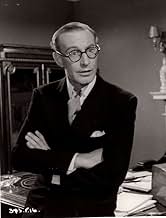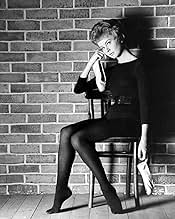Norman Truscott is a store worker who dreams of stardom. Vernon Carew is a singer whose star is fading. Vernon manages to get a recording of Norman singing and passes it off as himself.Norman Truscott is a store worker who dreams of stardom. Vernon Carew is a singer whose star is fading. Vernon manages to get a recording of Norman singing and passes it off as himself.Norman Truscott is a store worker who dreams of stardom. Vernon Carew is a singer whose star is fading. Vernon manages to get a recording of Norman singing and passes it off as himself.
- Director
- Writers
- Stars
Alan Beaton
- Club Member
- (uncredited)
Barbara Bennett
- Lady in Theatre
- (uncredited)
Paul Beradi
- Party Guest
- (uncredited)
Eddie Boyce
- Theatre Patron
- (uncredited)
Richard Caldicot
- Conductor
- (uncredited)
Pauline Chamberlain
- Showgirl
- (uncredited)
- Director
- Writers
- All cast & crew
- Production, box office & more at IMDbPro
6.5669
1
2
3
4
5
6
7
8
9
10
Featured reviews
The big flaw in one of the film's major plot points...
One of the main plot points of the film is that Norman is afraid to sing in front of anyone, unless his girlfriend is present. And yet the first time we do see him singing it's at the theatre, amidst/in front of an audience, shamelessly upstaging the famous singer who gave him the free tickets in the first place... but his girlfriend couldn't even accompany him because she already had another engagement! Which makes his frequent later complaints that he can't sing because she's not there, ludicrous.
The best thing about the film is the many guest appearances, especially Ron Moody as the doleful violinist. But as far as I'm concerned, Jerry Desmonde is the true star of the film - his television performance of his new hit song is hysterical. But why on earth did Vernon Carew think that Norman's singing voice would revive his career? I can only imagine what Vernon's faithful fans would think of his transition from mellow crooner to sounding - in that particular song - like a cross between Huckleberry Hound and Goofy! (To be brutally frank, I can't believe anyone in the real world would think that was a good singing voice.)
I can't say I'm a huge fan of Norman Wisdom : he's okay in small doses, but quite often his scenes of gurning and capering go on so long they become intolerable. Having an idea of what he was like in real life (thanks to the many TV interviews he gave) it's clear that he had a pretty high opinion of himself and his many talents, and that comes across in his many of his films - especially the later ones where he has more involvement in the writing, staging, and so on.
Great nostalgic film and extremely funny in places
This is a lovely film starring a lovely man, with some genuinely funny moments. In the part where he gets hypnotised, you really see his acting ability. In a way it's sad that Norman Wisdom is not part of this day and age. If he was he may have taken on serious film roles, as the likes of Jim Carrey have. This is definitely one of his best films, and one that my whole family loves. He also has a great voice, and at some point must have had to make a decision whether to pursue a singing or acting career. Incidentally, Norman has great support from the likes of Hattie Jacques and John Le Measurier who give assured performances. A film from a different age.
Quite funny
Norman Wisdom plays a labourer who is also a big fan of singer Vernon Carew. He sees Carew perform live, and manages to annoy the singer from his place in the crowd more than once. The final straw comes when Norman stands up and is singing Carew's famous song, trying to get the crowd properly excited (Carew's stardom is definitely waning) - but what comes to pass is that some head honchos hear Norman's wonderful voice, singing Vernon's song, and get the idea for Norman to dub for Vernon on his up and coming record. The general idea is quite similar to that which was used in Singin' In The Rain, but Follow A Star is not quite that good a movie. Still, it is quite good, and the music isn't bad. 7 out of 10.
Piece of soap opera?
No, rather "rest in peace, my sorrow" extravaganza! I am not a fan of Mr Norman Wisdom. But I enjoy good and easy comedies which, however insane, never get vulgar. This is a perfect example of such thing. I can watch the majority of Charlie Chaplin's, Buster Keaton's, and Norman Wisdom's movies anytime. They are timeless. Very often, when I watch a modern comedy ("Meet the Parents", for instance), I get real angry and ask myself: "WTF? Is this supposed to be good and funny?" Whenever I watch the good old Norman Wisdom movies, I don't have to ask myself such questions - I just rejoice. When I start watching such a movie, I know beforehand that there won't be anything rude, annoying, dirty, and vulgar - this alone supplies me with pleasant feelings.
Again I'm impressed by the talent of Mr Norman Wisdom. The songs he performs are beautiful. There is something "jazzy" about them and I like it.
By the way, in our country the film goes under the title "Mister Pitkin na Estrade" ("Mr Pitkin on the Stage") though the main character is not Pitkin but Norman Truscott. It happens because for Russian audience Mr Norman Wisdom will always be Pitkin on the screen. But that is a sign of quality. Like "Apple" among computers.
"RoboCop", "Batoru Rowaiaru", "Long xiao ye", "Jeeves and Wooster", "Lyudi i manekeny", "Mad Max", and ... "Follow a Star" are all great. Does it look strange? It shouldn't. In my humble opinion, there is a high-quality movie behind each title.
Such comedies like this one are fading away in today's hectic cybernetic world but to me they are the best of the best, because they remain childish and amusing in a very pleasant way.
Again I give a very subjective mark - a 10 out of 10 - but I'm 100% sure that such comedies are of the highest artistic quality. Thank you for attention.
Again I'm impressed by the talent of Mr Norman Wisdom. The songs he performs are beautiful. There is something "jazzy" about them and I like it.
By the way, in our country the film goes under the title "Mister Pitkin na Estrade" ("Mr Pitkin on the Stage") though the main character is not Pitkin but Norman Truscott. It happens because for Russian audience Mr Norman Wisdom will always be Pitkin on the screen. But that is a sign of quality. Like "Apple" among computers.
"RoboCop", "Batoru Rowaiaru", "Long xiao ye", "Jeeves and Wooster", "Lyudi i manekeny", "Mad Max", and ... "Follow a Star" are all great. Does it look strange? It shouldn't. In my humble opinion, there is a high-quality movie behind each title.
Such comedies like this one are fading away in today's hectic cybernetic world but to me they are the best of the best, because they remain childish and amusing in a very pleasant way.
Again I give a very subjective mark - a 10 out of 10 - but I'm 100% sure that such comedies are of the highest artistic quality. Thank you for attention.
Follow a Star
"Truscott" (Norman Wisdom) spends much of his days at work in a laundry dreaming of a stardom that might just come his way when he encounters legendary crooner "Vernon Carew" (Jerry Desmonde). This man's star is very much on the wain until he hears his new friend sing and hits on the idea of "borrowing" his voice - without telling or paying him, of course. His career rejuvenated, it's only his vocal coach "Dymphna" (Hattie Jacques) who recognises the true owner of the voice but what to do. "Truscott" can only sing if his beloved "Judy" (June Laverick) is there to encourage him and that's not possible right now. As "Carew" heads to the bright lights of the London Palladium, our plucky hero's friends have to think of a way of showing where the real talent lies. How, though? This is another decent showcase for Wisdom to show that he had quite a few strings to his bow. His semi-slapstick comedy timing is perfect but here he proves that he can also hold a tune, delivering a few of the numbers that fit entertainingly into the story. The story itself, though, is far too long. It could readily lose half and hour and not suffer. Indeed were it a tighter production with less meandering, it'd be quite a solid tale that could have better played to Wisdom's strengths, those of writer Jack Davis and the very Rutherford-esque efforts of an on-form Jacques. As it is, it struggles to stay engaging until perhaps the last ten minutes when life is breathed back into it and some laughs are to be had. It's still quite a fun vehicle for it's star and is a perfectly watchable example of his work.
Did you know
- TriviaTony Hatch wrote a song for the film, but Norman Wisdom insisted that he should be allowed to write the theme song. Hatch's song was re-titled and used in "Circus of Horrors (1960)."
- GoofsNorman is talking to the hypnotist at 1:10:00 his lips do not match what the voice over is saying about "like I depend on..."
- ConnectionsFeatured in Norman Wisdom: His Story (2010)
- SoundtracksFollow a Star
by Norman Wisdom
Details
- Release date
- Country of origin
- Language
- Also known as
- Enayiler Kralı Yıldızlar Peşinde
- Filming locations
- Production company
- See more company credits at IMDbPro
- Runtime
- 1h 33m(93 min)
- Color
- Sound mix
- Aspect ratio
- 1.37 : 1
Contribute to this page
Suggest an edit or add missing content






























